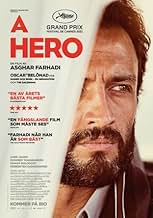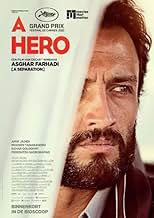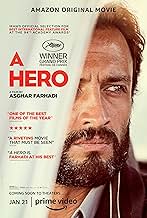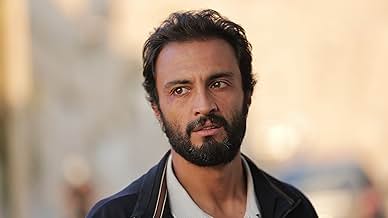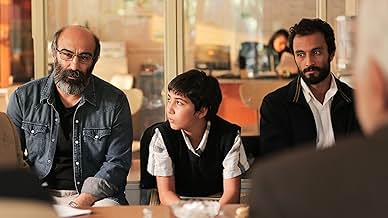Rahim ist im Gefängnis wegen einer Schuld, die er nicht zurückzahlen konnte. Er versucht, seinen Gläubiger davon zu überzeugen, seine Klage gegen die Zahlung eines Teils der Summe zurückzuzi... Alles lesenRahim ist im Gefängnis wegen einer Schuld, die er nicht zurückzahlen konnte. Er versucht, seinen Gläubiger davon zu überzeugen, seine Klage gegen die Zahlung eines Teils der Summe zurückzuziehen. Doch die Dinge verlaufen nicht wie geplant.Rahim ist im Gefängnis wegen einer Schuld, die er nicht zurückzahlen konnte. Er versucht, seinen Gläubiger davon zu überzeugen, seine Klage gegen die Zahlung eines Teils der Summe zurückzuziehen. Doch die Dinge verlaufen nicht wie geplant.
- Auszeichnungen
- 18 Gewinne & 42 Nominierungen insgesamt
- Mrs. Radmehr
- (as Fereshteh Sadrorafaei)
- The Taxi Driver
- (as Ali Hasannejad Ranjbar)
Empfohlene Bewertungen
Written & directed by Farhadi (About Elly & The Salesman), the premise is deceptively simple as expected and yet again, using mere truth & lies, the director weaves a tightly structured & intricately layered narrative that keeps us on the edge at all times. His unfailing ability to take a seemingly straightforward situation and then effortlessly turn it into a complex, challenging & nerve-wracking moral conundrum is one trait that never fails to impress.
What makes Farhadi's latest film so gripping & effective is that we as viewers can relate to what the protagonist is trying to do but we also see him unnecessarily dragging himself into a predicament that becomes increasingly difficult to escape from with every decision he makes and yet, all we can do is be a spectator to his undoing. Amir Jadidi's performance is crucial to this web of truth, lies, morality, deceit, honour, conscience & consequence and he plays his role to perfection.
Overall, A Hero is an ingeniously crafted & tautly narrated drama that unfolds with the unrelenting ferocity, nail-biting tension & edge-of-the-seat quality of a first-rate thriller and is accomplished enough on all fronts to cement its spot amongst the best all-round films of 2021. Presenting the Persian auteur at the apex of his craft while also establishing him as a luminary who's operating on a whole another level and is far ahead of his contemporaries, A Hero is top-tier cinema & a flat-out masterpiece.
As with his previous movies "A Separation" and "The Salesman," Farhadi presents us with an ambiguous situation and then sits back and observes what happens as a varied cast of characters try to navigate it. There are no good guys or bad guys, and there's no clear right or wrong. Some people do good things for the wrong reasons. Some people do bad, or at least hurtful, things for a good reason. Many characters fall into both categories. I love Farhadi's films because they don't editorialize and they acknowledge that the world we live in is messy and complicated and that nothing, not ideas or people or beliefs, can fall into the tidy buckets that our social media world wants them to.
Grade: A.
Amir Jadidi caries the movie. He wrestles with a moral dilemma and tries to do the right thing but circumstances do not favor him. He beautifully portrays the character's mild mannerisms and shows his anger due to festering frustrations and flare ups. Supporting cast has done a great job. Overall a decent movie which feels REAL and offers the viewer something new.
Couple of comments: this is the latest from Iranian writer-director Asghar Farhadi, who has won Oscars for both 2011's "A Separation" and 2016's "The Salesman". Here once again Farhadi takes a look at a slice of life, where thing don't evolve as expected. On its face, the movie, very much like Farhadi's prior films, is deceitfully simple but in fact it examine many different aspects: a divorced man with a young son who stutters; the accumulative effects of so-called white lies; the peer pressure to conform in a conservative society. In the end, "A Hero" is another complex, nuanced morality play from Asghar Farhadi that, like an onion, reveals more with each layer as the movie goes by. The no-names cast is fantastic from start to finish. Filmed in the city of Shiraz (in southwest Iran), the film also offers a glimpse of what daily life in Iran looks like today (guess what: they are people just like us, many struggling to simply make ends meet).
"A Hero" premiered at last year's Cannes Film Festival to immediate critical acclaim (and winning one of the festival's major prizes). After a limited US theatrical release, the movie moved to Amazon Prime this weekend, where I caught it. If you are in the mood for another top-notch foreign morality play that is is as universal as it is spellbinding, I'd readily suggest you check this out, be it on Amazon Prime, Amazon Instant Video, or eventually on DVD/Blu-ray, and draw your own conclusion.
But Asghar Farhadi is known for not taking the easy way. In 'A Hero', the good guy can turn out to be bad after all, and vice versa. Or, more accurately, the division between good and bad is blurred. Everyone has good intentions, but sometimes they come out bad.
This is why Farhadi is one of the greatest contemporary film makers. His films deal with moral issues, just as people in the real world do. His characters are complex, like we alle are. There are no easy solutions to the problems, just as in real life.
'A Hero' tells the story of an ordinary man who gets involved in a situation he no longer controls. He is perceived as a hero because he returned a bag with valuables to its owner, but when his story is doubted, fate turns against him. The situation becomes complex, more and more people get involved and there is gradually more at stake as the story unfolds.
The screenplay of this film is perfect. Every details has a meaning somewhere in the story. Things are not spelled out, but nothing is left vague. The beauty is also that this is a circular story, with an end that is the opposite of the beginning. The very last scene is wonderful in its simplicity and understated meaning.
With this film, Farhadi shows us also what life is like in modern Iran. It's not a political film and the story is rather universal, but several elements can be perceived as critical for Iranian society. The 'hero' is jailed for an unpaid debt, which is something we don't do in western countries. He has to keep his relationship with his girlfriend a secret, because they are not married yet. Another character had to spend his daughter's dowry, and we see her as an unmarried woman, living with her father.
For me 'A Hero' is one of the best films I've seen this year and also one of the best films Farhadi has made. A perfectly told story, which keeps on offering new elements to evaluate reality - that is what film making should be all about.
Wusstest du schon
- WissenswertesWas inspired by the true story of Mohammad Reza Shokri, a man who returned a bag of cash he found while on a leave from a debtors' prison in Shiraz.
- Zitate
Salehi: What's up?
Rahim Soltani: I don't want this to be shared.
Salehi: Believe me, when he was speaking, I nearly cried. Whoever sees it will be overwhelmed.
Rahim Soltani: I don't want my son to be seen like that.
Salehi: It's to your advantage and his. People will be on your side. Even that woman may see it and call you.
Rahim Soltani: No, delete it.
Salehi: Think a bit... The kid said nothing bad.
Rahim Soltani: I don't want...
Salehi: You think it's only about what you want? The reputation of all of us is at stake.
Rahim Soltani: You want it back through my son's stutter?
- SoundtracksBe Raghsa
Performed by Mohsen Chavoshi
Top-Auswahl
- How long is A Hero?Powered by Alexa
Details
- Erscheinungsdatum
- Herkunftsländer
- Offizielle Standorte
- Sprache
- Auch bekannt als
- A Hero
- Drehorte
- Produktionsfirmen
- Weitere beteiligte Unternehmen bei IMDbPro anzeigen
Box Office
- Weltweiter Bruttoertrag
- 2.916.932 $
- Laufzeit
- 2 Std. 7 Min.(127 min)
- Farbe
- Seitenverhältnis
- 2.39 : 1




